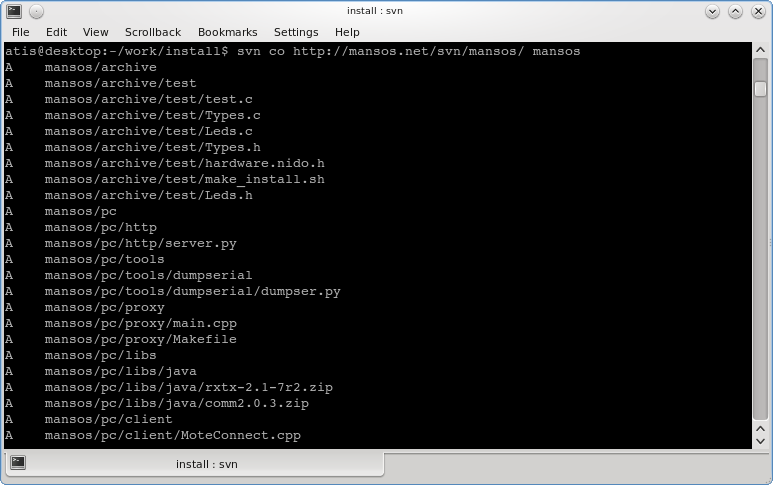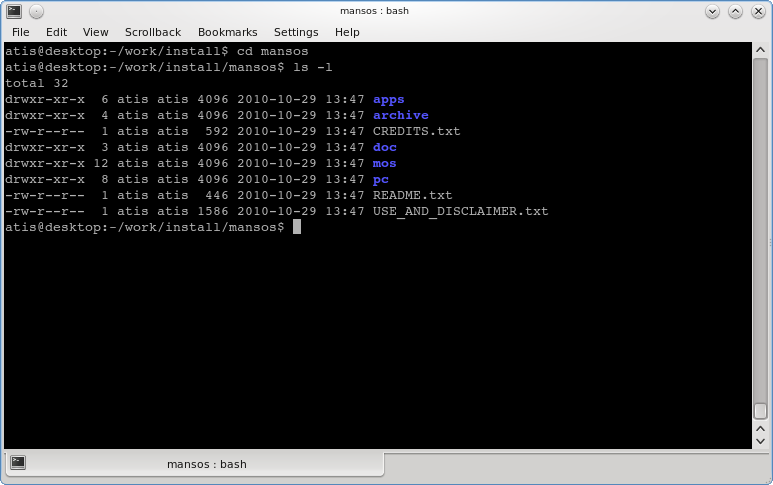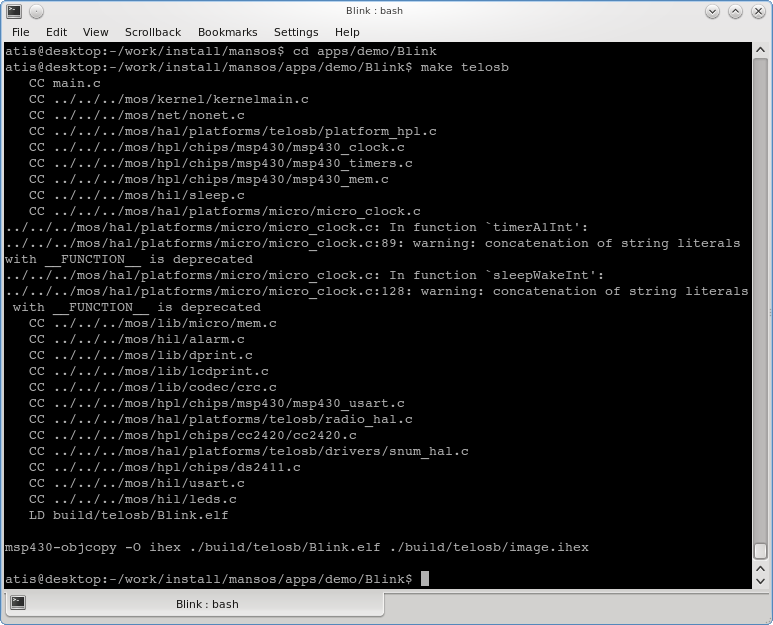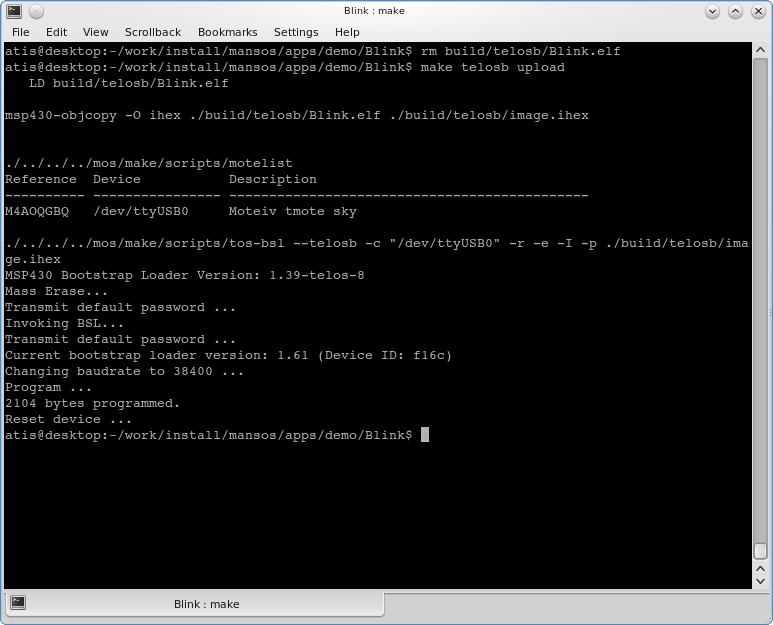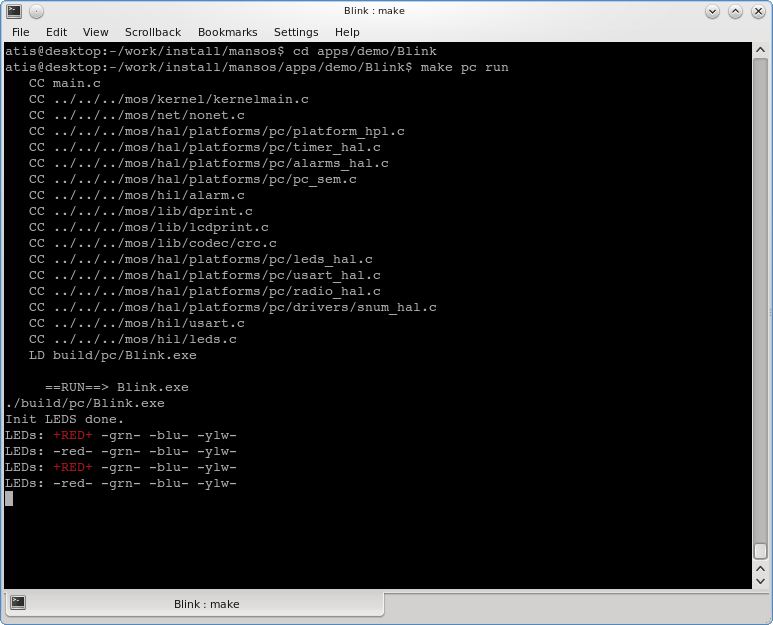Installing MansOS
All of the major desktop operating systems (Linux, Windows, MacOS) are supported as MansOS development hosts.
Contents
Step #1: Prerequisites for installation
In general, the following programs are needed:
- Compiler and binutils (msp430-gcc)
- GNU make
- Python
If you already have them, you can skip this section.
Linux, *BSD
Using manual installation
Download and install either of these:
- http://mspgcc4.sourceforge.net/ - provides MSP tools based on GCC version 4
- http://mspgcc.sourceforge.net/ - same, but for GCC version 3 (older)
After installing msp430-gcc you'll need to set up you $PATH correctly. Add this line to your ~/.bashrc file (assuming msp430-gcc is installed in /opt):
export PATH="/opt/msp430-gcc/bin:$PATH"
Using package management software
Some organisations provide .deb packages for MSP and AVR GCC tools. See one of these links for details:
Windows
MansOS on Windows is supported using Cygwin. (It may also work with MinGW.)
Download and install Cygwin. Here's a direct link to the setup program.
Make sure to select the following Cygwin packages:
- gcc
- make
- python
- svn
- openssh (if you'll want to use non-anonymous SVN access)
- rpm (if you'll want to use the pre-made RPM packages for installation)
After this you'll need to install msp430 tools. There are two options for this:
- Installing the tools manually
- Installing the tools from RPM packages provided by TinyOS
Manual installation
Follow the instructions in mspgcc homepages. Download and install either of these:
- http://mspgcc4.sourceforge.net/ - provides MSP tools based on GCC version 4
- http://mspgcc.sourceforge.net/ - same, but for GCC version 3 (older)
Installation using RPM packages
The recommended way to install msp430 tools is to use rpm packages provided by TinyOS. Download the RPM packages:
http://www.tinyos.net/dist-2.0.0/tools/windows/msp430tools-base-0.1-20050607.cygwin.i386.rpm http://www.tinyos.net/dist-2.0.0/tools/windows/msp430tools-python-tools-1.0-1.cygwin.noarch.rpm http://www.tinyos.net/dist-2.0.0/tools/windows/msp430tools-binutils-2.16-20050607.cygwin.i386.rpm http://www.tinyos.net/dist-2.0.0/tools/windows/msp430tools-gcc-3.2.3-20050607.cygwin.i386.rpm http://www.tinyos.net/dist-2.0.0/tools/windows/msp430tools-libc-20050308cvs-20050608.cygwin.i386.rpm
Install the RPM packages:
$ rpm -ivh --force --nodeps --ignoreos *.rpm
Finishing installation
Set up you $PATH to point to msp430-gcc tools. Add this line to your ~/.bashrc file (assuming msp430-gcc is installed in /opt):
export PATH="/opt/msp430-gcc/bin:$PATH"
The .bashrc file can be found in your home directory, which is a location like this: C:\cygwin\home\username\.bashrc.
Support for serial port interfacing with motes
To upload compiled programs to a mote you'll need to install proper USB to serial port drivers first. The drivers are included in Tmote Sky driver CD. If you don't have the CD, download the drivers from here. For more details consult the Tmote Sky Quick Start Guide, section USB Serial COM Driver Install (page 7). The guide is availabe at http://www.cems.uvm.edu/~crobinso/mote/tmote-sky-quickstart-110.pdf.
Now install MansOS sources and check that motelist detects all motes attached to the Windows PC:
$ motelist Reference CommPort Description ---------- ---------- ---------------------------------- M4AOQGBQ COM8 tmote sky
MacOS
... TODO ...
Step #2: Getting MansOS
Using version control system
MansOS sources are available for anonymous checkout from SVN:
$ svn co http://mansos.net/svn/mansos/ mansos A mansos/archive A mansos/archive/test ... Checked out revision 732.
If you also want to receive SVN write access, contact MansOS developers.
Using package management software (broken at the moment!)
Get the MansOS Debian package:
File:Mansos 0.1.0-20101023 all.deb
Step #3: Testing your installation
$ ls mansos apps archive CREDITS.txt doc mos pc README.txt USE_AND_DISCLAIMER.txt
To test building for TelosB (Tmote Sky):
$ cd mansos/apps/demo/Blink $ make telosb
If you have motes attached:
$ make telosb upload
To test serial port output:
$ cd mansos/apps/demo/CounterToSerial $ make telosb upload
Now you can use a tool like minicom or putty (on Windows) to monitor the serial port. The settings: baudrate=38400, flow-control turned off.
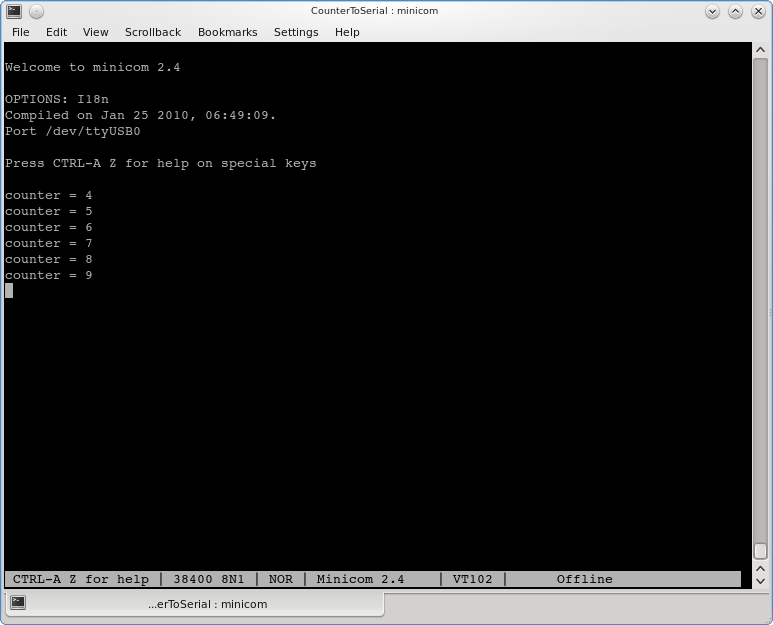
To test the PC simulator:
$ make pc $ make pc run
